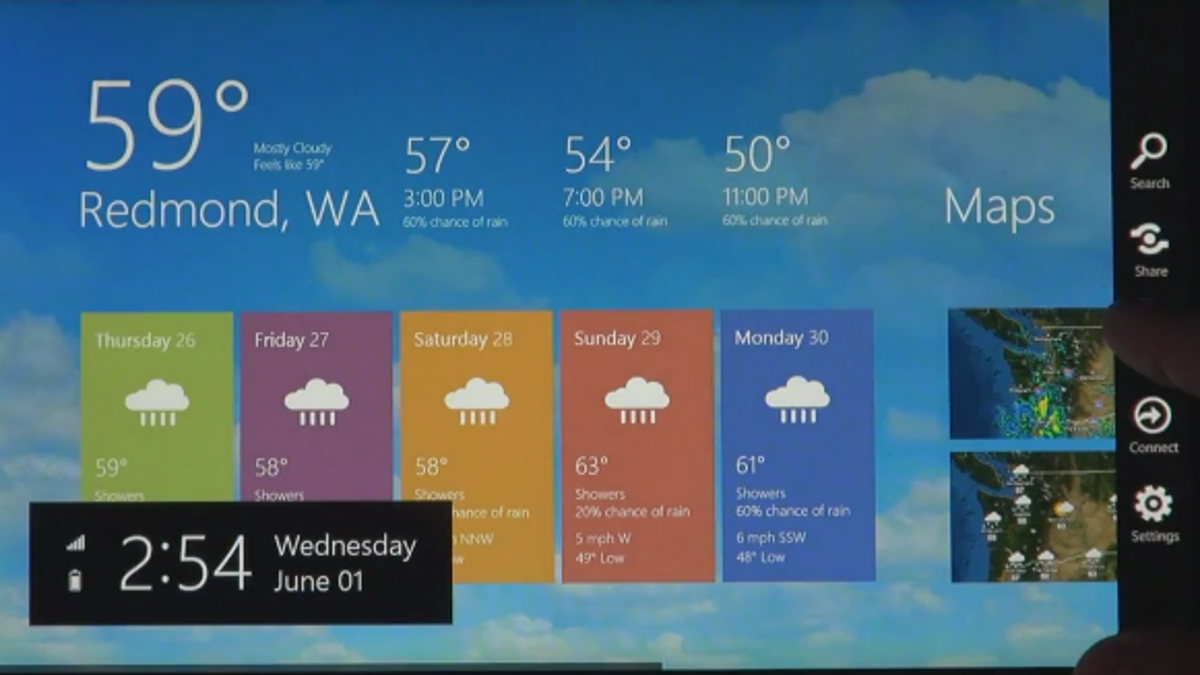Windows 8, iOS 6 set for tablet face-off in 2012
Microsoft says the next version of Windows will not be out this fall, making 2012 a better candidate. Will Apple be on iOS 6 by then?

The next version of Microsoft's Windows operating system puts a much bigger emphasis on tablets, yet by the time it's released Apple could be a whole two versions ahead from where it's at with its current tablet OS.
During Microsoft's public preview of its tablet-friendly next-generation Windows at the D9 confab earlier today, Windows and Windows Live boss Steven Sinofsky said the software would not be released this fall, and that a safer estimation would be that the company releases a new version of the software every "two to three years." As a frame of reference, Microsoft
That message comes just days ahead of when Apple plans to take the wraps off iOS 5, the OS that runs on Apple's iPhone, iPod Touch, and iPad. Apple's announced a new version of that software every year since 2007 and has said it will do so with the fifth major iteration at its Worldwide Developers Conference next week. Even if Apple doesn't ship iOS 5 within the usual June time frame, it's a good bet it will at least be out this fall, potentially well ahead of Windows 8 and putting iOS 5's successor on a collision course with the next Windows release.
Related stories
Windows 8 premiere raises more questions than answers
Sinofsky shows off Windows 8 at D9
How the demo played out
Of course, a better match-up between the two is Lion, the latest version of the Mac OS, which Apple is also demoing next week, and will likely give a price and a release date. That particular release has acquired a few iOS-like features, but the fact remains that it's not a tablet OS.
Microsoft's approach--as seen from the limited demo it offered today--is the same one it's been singing the praises of for years: there doesn't need to be a difference in a tablet OS and Windows as you know it. Applications can be skinned to be touch and tablet friendly, yet can also revert to standard Windows applications you'd use with a mouse and keyboard. In other words, you can can have your tablet, and a computer too.
Microsoft's reasoning there, according to Sinofsky, is that certain applications need that particular interface. That's as opposed to the developer having to completely reformulate an application, and custom-tailor it to whatever platform its on.
Sinofsky said Microsoft will be providing developers with APIs for building touch-centric applications that are able to connect to Windows applications, hopefully bridging the gap between the two.That approach is worlds apart from Apple's, at least with iOS. There the company has long stressed specific user design guidelines for iOS applications that tell developers to make applications that match the operating system's UI aesthetic.
From Apple's iOS Human Interface Guidelines document:
You know what your app does and who its audience is; now you need to make sure that your app looks and feels like it was designed expressly for an iOS-based device. This is crucial because people have high expectations for the apps they choose to install on their devices. If your app feels like it was designed for a different device, or for the web, people are less likely to value it.
Microsoft's rebuttal to that during today's demo was that legacy software is a crucial part of the Windows experience and that everything should be able to run on that platform.
One other area where Microsoft's thinking differently is that its tablet can double as a normal computer, letting users plug their existing peripherals in just like they would with a laptop. While Apple sells a keyboard accessory and is able to work with Bluetooth keyboards, the fact remains that iOS at its very core is all about touch. Adding a keyboard for apps like e-mail, word processors, and Web browsing makes sense--yet for most everything else, a mouse does not.
So will iOS 5 adopt these plug-and-play similarities on the tablet side? It's unlikely. What about Mac OS X getting more tablet friendly? Some of the features that have been brought over to Lion, including the iOS-like Launchpad app launcher, touch-screen-like trackpad inversion, and visual styling, suggest it's headed in that direction. Yet it would be at odds with the iPad if such a device were to run Mac OS X instead.
If anything's clear, it's that Microsoft still has some tricks on its sleeve. The split soft keyboard approach, which was the hallmark of the ill-fated ultra portable PC movement, is back and designed to give tablet users a way to type with their thumbs while holding the device. Microsoft's also on the brink of having an operating system that will run on x86 and ARM architectures, an area where Apple's currently divided with its computing efforts (which may not be the case forever).
We'll know more about where Apple's taking its tablet and mobile phone operating system next Monday, when WWDC kicks off. Expect a jab or two at Windows 8 from Cupertino along the way.

